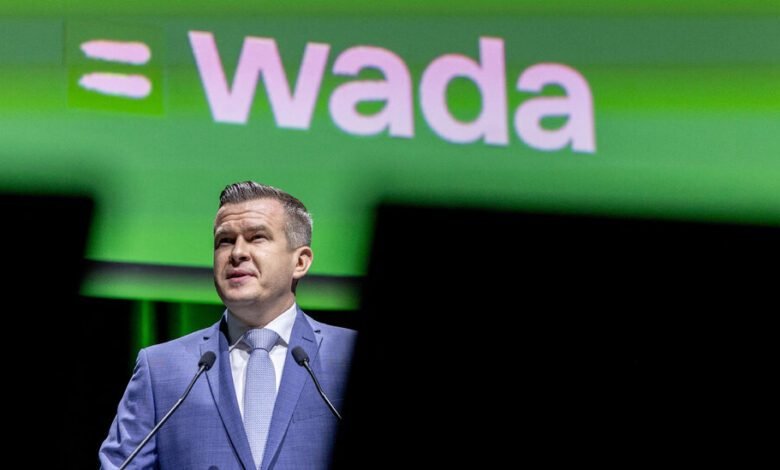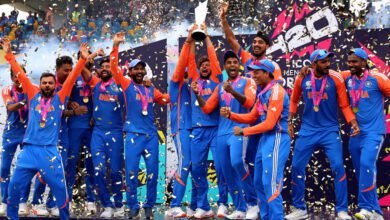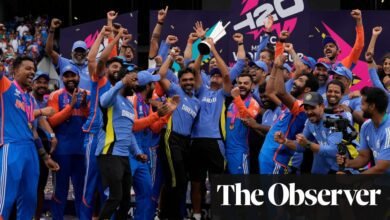Ahead of the Olympics, the World Anti-Doping Agency faces a crisis of confidence

Two months before the scheduled start of the Paris Olympics, the global agency tasked with policing doping in sport faces a growing crisis as it defends itself against allegations that it helped cover up the positive tests of elite Chinese swimmers who competed – and they won. medals – at the last Summer Games.
The allegations are particularly vexing for the World Anti-Doping Agency, which has long touted itself as the gold standard in the global clean sports movement, because they raise the specter that the agency — and, by extension, the entire system created to try to hold the Olympics clean – not reliable.
Athletes openly question whether WADA can be trusted to do its core job of ensuring a level playing field in Paris, where some of the same Chinese swimmers are favorites to win more medals.
And in recent days, pressure on WADA has increased significantly, especially from the United States, which is one of the agency’s main funders, and as new questions have emerged about WADA’s appointment of an independent prosecutor to investigate the allegations, and whether WADA provided an accurate account to the public of the appointment, according to interviews and documents reviewed by The New York Times.
On Wednesday, the Biden administration’s top drug official – who is also a member of WADA’s executive committee – sent a scathing letter to the anti-doping agency explaining how necessary it is to appoint a truly independent commission to investigate how positive tests were handled and demanding that its executive board will hold an emergency meeting within the next 10 days.
“Let me underscore the extreme concern I have heard directly from American athletes and their representatives regarding this issue,” the official, Dr. Rahul Gupta, wrote in the letter, which was sent on Biden administration letterhead. “As I shared with you, athletes have expressed that they are heading into the Olympic and Paralympic Games with serious concerns about whether the playing field is level and whether the competition is fair.”
That same day, the senator responsible for the subcommittee that provides funding to WADA, Chris Van Hollen, Democrat of Maryland, said, “We need answers before we support future funding.” (The United States contributes more to the WADA budget – pledging more than $3.6 million this year – than any nation; the International Olympic Committee matches everything the United States gives.)
Then, on Friday, a congressional aide said a bipartisan House committee investigating the Chinese Communist Party had begun looking into the positive tests.
Lilly King, a two-time Olympic gold medalist and member of USA Swimming’s Athlete Advisory Council, said she no longer trusts that WADA is doing its job to keep athletes who violate anti-doping rules out of the Games.
“When I go up the blocks, I’m not sure the people to my right and left are clean,” King said in a phone interview Friday. “And that’s really unfortunate, because it’s not something I should be focusing on while racing in the Olympics.”
Mounting pressure and growing concerns about the credibility of Olympic competitions have been met with silence from the two groups that represent an important part of the International Olympic Committee’s revenue: its main broadcaster and sponsors.
NBC, whose broadcast rights payments represent a significant portion of the IOC’s total budget, did not respond to a question about whether it was confident it would broadcast an Olympics where viewers could trust the athletes they watched would be clean.
The Olympics’ multimillion-dollar sponsors — Visa, Airbnb, Coca-Cola and Intel — did not respond to messages seeking comment on whether they were concerned about linking their brands to Games in which athletes have expressed concerns about cheating. Allianz, a German financial services company, also declined to comment.
The New York Times reported last month that WADA failed to follow its own rules after 23 elite Chinese swimmers tested positive for the same drug banned in 2021, months before the last Summer Olympics. The drug – trimetazidine, known like TMZ – is a prescription heart medication, but it is popular among athletes looking for an edge because it helps them train harder, recover faster, and move quickly through the body, making it harder to detect.
Two days after the Times article was published, WADA President Witold Banka and other senior agency officials held a press conference during which they said they had no choice but to accept the explanation provided by China’s anti-doping agency for the testing. positive. The Chinese agency claimed that all of the swimmers inadvertently ingested the drug because they ate food from a kitchen contaminated by TMZ.
In the days that followed, WADA published an extensive document that once again attempted to explain its decision.
But neither measure satisfied athletes, sports officials and anti-doping authorities, perplexed by WADA’s apparent reluctance to pursue its own investigation into the positive tests. However, just days after the news became public, WADA appointed a special prosecutor, Eric Cottier, to review its handling of the case.
That decision also quickly drew criticism.
Cottier is the former attorney general of Vaud, a Swiss region that has become the center of international sport and is home to several sporting organizations, including the IOC. But interviews showed that Cottier was appointed to lead the investigation by the WADA official in charge of auditing the agency’s intelligence and investigations department at the time the Chinese swimmers tested positive.
The auditor, Jacques Antenen, served as chief of police of Vaud under Mr. Cottier when he was attorney general of Vaud. In a telephone interview on May 3, Antenen said that he contacted Olivier Niggli, WADA’s most senior administrator, in the days following the release of the positive tests to suggest that Cottier might be a good choice to lead the investigation.
“I didn’t recommend it; I just said if you need someone, it’s a good choice,” Antenen said. He said he did not know if others had been considered for the role.
Regardless of Cottier’s abilities and qualifications, his physical proximity to figures close to WADA, the IOC and the sports movement is problematic, governance experts said.
Cottier and Christoph de Kepper, director general of the IOC, were among those who celebrated Antenen’s retirement from the police force at a party in 2022. The IOC contributes half of WADA’s $40 million annual budget.
The celebration, which was published in the police service’s internal magazine, was first reported by the Associated Press. A caption with a photo of two of the men in the magazine reads: “Attorney General Eric Cottier came to greet his old friend Jacques Antenen.”
A WADA spokesman, James Fitzgerald, said that his agency had, in fact, first contacted Mr. Antenen to ask “if he knew anyone with the necessary credentials, independence and availability to conduct a full review of the treatment of WADA in this case. ”
“These attempts to undermine the integrity of a highly regarded professional as he begins his work are becoming increasingly ridiculous and are intended to undermine the process,” Fitzgerald said.
There are also new questions about WADA’s public statements relating to Mr. Cottier’s appointment. In a statement to The Times, WADA said it discussed Cottier’s appointment with its board before formally appointing him to the role.
But Dr. Gupta’s Office of National Drug Control Policy said in a statement that shortly before the formal announcement of Mr. Cottier’s hiring in April, WADA told its board that an investigator had already been chosen.
Gupta said in his letter to WADA that he was “deeply concerned” that the executive committee “was not adequately briefed with essential information throughout this process.”
Current and former athletes are now calling for more testing around the world ahead of the Paris Games, but have acknowledged that their concerns about the global anti-doping regulator are unlikely to be allayed in time for the opening ceremony.
King, the American swimmer, said that when she learned of the undisclosed positive tests, she felt like it was a repeat of her experience at the 2016 Rio Olympics, when she won the gold medal in the 100-meter breaststroke in a Russian swimmer Yulia Efimova, who failed a drug test earlier that year but was allowed to compete after the result was overturned on appeal.
Katie Meili, the athlete’s representative on USA Swimming’s board of directors and the bronze medalist in that race behind King and Efimova, said the athletes “put a lot of faith in WADA.”
“Yes, positive tests are a concern and that is a bad thing,” she said. “But even more worrying to me is that the international regulator is not doing its job.”
Amy Chang Chien contributed research.




